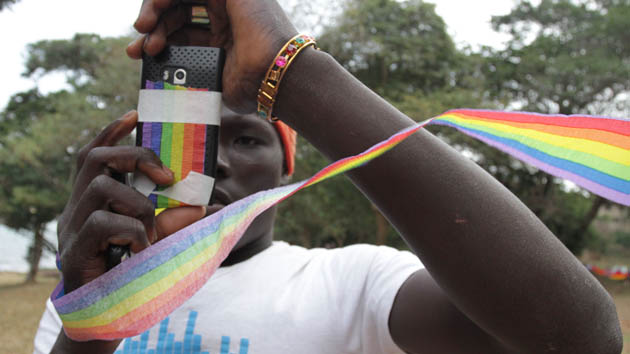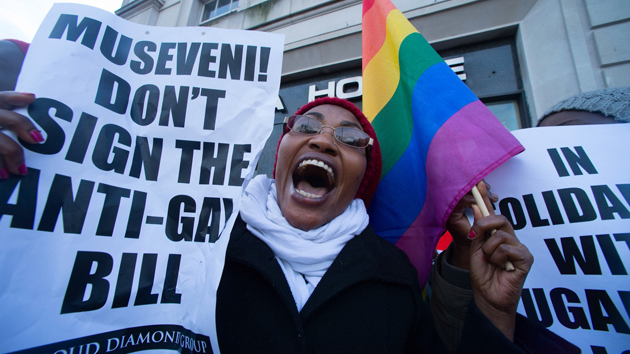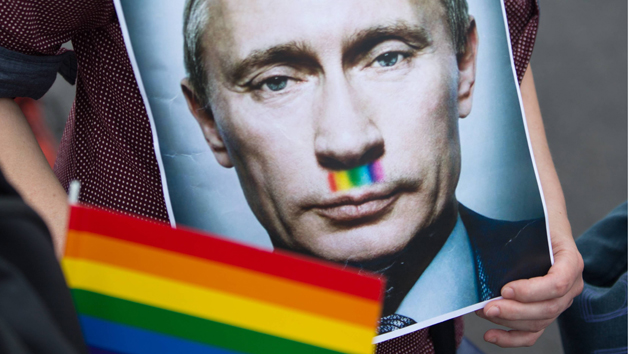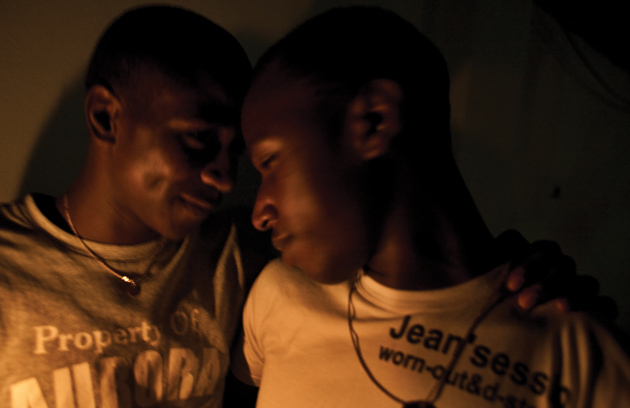In late February, when Ugandan President Yoweri Museveni signed the nation’s harsh new anti-gay bill into law, he claimed the measure had been “provoked by arrogant and careless western groups that are fond of coming into our schools and recruiting young children into homosexuality.” What he failed to mention is that the legislation—which makes homosexuality a crime punishable by life in prison in some cases—was itself largely due to Western interlopers, chief among them a radical American pastor named Scott Lively.
Lively, a 56-year-old Massachusetts native, specializes in stirring up anti-gay feeling around the globe. In Uganda, which he first visited in 2002, he has cultivated ties to influential politicians and religious leaders at the forefront of the nation’s anti-gay crusade. Just before the first draft of Uganda’s anti-gay bill began circulating in April 2009, Lively traveled to Kampala and gave lengthy presentations to members of Uganda’s parliament and cabinet, which laid out the argument that the nation’s president and lawmakers would later use to justify Uganda’s draconian anti-gay crackdown—namely that Western agitators were trying to unravel Uganda’s social fabric by spreading “the disease” of homosexuality to children. “They’re looking for other people to be able to prey upon,” Lively said, according to video footage. “When they see a child that’s from a broken home it’s like they have a flashing neon sign over their head.”
Lively is not the only US evangelical who has fanned the flames of anti-gay sentiment in Uganda. As they lose ground at home, where public opinion and law are rapidly shifting in favor of gay equality, religious conservatives have increasingly turned their attention to Africa. And Uganda, with its large Christian population, has been particularly fertile ground for their crusade. Journalist (and past Mother Jones contributor) Jeff Sharlet has reported at length on the Family, a politically connected US-based ministry, which promotes hard-line social policies in the East African nation.
But, according to Ugandan gay rights activists, Lively has played an unparalleled role in fostering the climate of hate that gave rise to Uganda’s anti-gay law. “The bill is essentially his creation,” says Frank Mugisha, director of Sexual Minorities Uganda, a coalition of gay rights organizations. Mugisha’s group has filed a first-of-its-kind lawsuit in US federal court, accusing Lively of international crimes against humanity on the grounds that he and his Ugandan allies allegedly conspired to deprive gay Ugandans of basic human rights.
Lively, who is currently running for governor of Massachusetts as an independent, calls the allegations “ridiculous.” “Basically, a Marxist law firm in New York City is trying to shut me up because I speak very articulately about the pro-family issues,” he says. But video obtained by Mother Jones—including footage of Lively’s 2009 presentation and a little-known follow-up meeting where influential Ugandans resolved to petition parliament for a harsh new law against homosexuality—lends credence to the allegations that Lively’s fierce message paved the way for the nation’s anti-gay crackdown.
Lively has an unusual history for a family-values crusader. A former alcoholic, he spent his late teens and 20s drifting around the country, occasionally sleeping under bridges and begging for spare change. After finding God in a Portland, Oregon, treatment center in the mid-1980s, he joined a conservative evangelical church and took a job as communications director for the Oregon Citizens Alliance, which was loosely affiliated with the then powerful Christian Coalition and was deploying radical tactics to fight abortion and the gay rights movement. In 1992, OCA introduced a ballot initiative with the first faint outlines of the legislative strategy Lively would later deploy abroad. Measure 9, as it was known, barred the state government from offering any “special rights” to gays or “promoting” homosexuality. It also required public schools to treat “homosexuality, pedophilia, sadism” as “abnormal, wrong, unnatural, and perverse.”
The backlash was fierce. Opponents likened Lively and his colleagues to Nazis and lobbed bricks wrapped in swastika flags through the windows of businesses supporting the measure. OCA’s aggressive campaign, likening gays to pedophiles, was also blamed for a steep uptick in gay hate crimes. In the end, Measure 9 was defeated by a 13-point margin. Undeterred, OCA began promoting measures barring special protections for homosexuals on the city and county levels. Lively, who bristled at the Nazi comparisons, also threw himself into studying the Third Reich and eventually grew convinced that gay men—some of whom occupied senior posts in the Nazi regime—were the driving force behind the Holocaust. “Everything that we think about when we think about Nazis actually comes from the minds and perverted ideas of homosexuals,” he told an Oregon public access television station in 1994. OCA also began deploying messages reminiscent of Nazi propaganda. One OCA-published cartoon resembled the infamous Nazi caricature showing a Jew manipulating the strings of government and economy. As Deborah Geis and Steven Kruger observed in their 1997 book Approaching the Millennium, the group had merely replaced “the stooped, hooked-nose puppeteer with a fresh-faced gym boy.”
These tactics paid off: OCA managed to push through more than two dozen county and municipal ordinances. While the Oregon Legislature later rendered them unenforceable, OCA’s efforts kept the issue on the conservative agenda and showed the grassroots appeal of the group’s message. In 1994, the organization sponsored another statewide ballot initiative similar to Measure 9. It was defeated, too, but only by a 3-point margin.
After his bare-knuckled legislative battles in Oregon, Lively retreated to California, where he earned a law degree and a Ph.D. in theology. He also became a prolific author. In 1995, he coauthored what would become his signature book, The Pink Swastika: Homosexuality in the Nazi Party. It argued that gay elements in the Nazi regime tried to wipe out the Jews because their religion condemned homosexuality. And it claimed that gays intentionally spread immorality and corruption so others were “less likely to oppose homosexuality on moral grounds.” Pornography, according to this theory, is a “tool of ‘gay’ social engineering.” The rising rates of divorce, substance abuse, disease, and violent crime, are all a “direct consequence of embracing the ‘gay’ ethic.” In subsequent books, Lively laid out detailed tactics for battling this menace—including stressing the supposed danger homosexuality poses to young people. “Public sympathy for ‘gays’ as victims is not grounded in logic, but in emotion,” he wrote. “An effective strategy is to emphasize the issue of homosexual recruitment of children…”
Lively’s ideas have proven too radical for the mainstream family values movement, but they’ve gotten some traction on the far right. Bryan Fischer, director of issues analysis for the influential American Family Association, regularly parrots his arguments linking gays to Nazis. (“Homosexuality gave us Adolph Hitler,” he opined in a 2010 post on the organization’s website, “and homosexuals in the military gave us the Brown Shirts, the Nazi war machine and six million dead Jews.”) Lively’s theories have also gained currency in foreign countries, including former Soviet republics, where he has helped advance anti-gay legislation. But nowhere has his influence been more keenly felt than in Uganda. During his first visit there in 2002, he spoke at an anti-pornography conference and warned participants that Western cultural Marxists, backed by liberals (such as George Soros), were trying to erode Uganda’s independence by attacking family values—a message that played on lingering colonial-era resentments. One of their core tactics, Lively argued, was deploying homosexuals to infiltrate Ugandan society. “The cultural Marxists go into these countries, they buy media and they set up these street activist organizations to recruit,” Lively tells me. “I said, ‘Okay, this is what’s going on here. The way to respond to that is to focus on affirming family values—and discouraging the alternatives.'” Lively, who was used to being heckled, was stunned by the positive reception he received at the gathering.
Later the same year, an influential Ugandan Assemblies of God pastor named Stephen Langa invited Lively and his wife, Anne, back to Kampala for a barnstorming tour. Lively met with lawmakers, lectured at universities, and gave a number of media interviews. He and Langa also hosted an all-day conference with local pastors. The event was closed to the media and the public, but Lively later recalled that the pastors who attended were “very grateful” for his insights “about the way in which America was brought low by homosexual activism.”
Following the trip, Lively kept in contact with Langa, whom he calls his “ministry partner,” and another influential Ugandan pastor named Martin Ssempa. Both men would ultimately be at the vanguard of Uganda’s anti-gay crackdown.
In early March 2009, Lively returned to Uganda at Langa’s invitation. Uganda’s High Court had recently found that the government overstepped its authority by detaining two gay activists simply because they were gay. In response, a Langa-run group called the Family Life Network planned a three-day conference to expose what he called the “hidden and dark” gay agenda. On the last day, Lively gave a marathon five-hour presentation, which was broadcast on Ugandan television. He claimed that homosexuals were aggressively recruiting Uganda’s children and argued that human rights protections shouldn’t be extended to these “predatory” figures.
Lively also told attendees—among them Ugandan cabinet members—that the gay movement was an “evil institution” that sought to “defeat the marriage-based society” and crush anyone who stood up to its nefarious agenda. At one point, he scrawled “Causes and Types of Homosexual Dysfunction” across the top of a white board and, beneath this, drew a continuum with what he claimed were the various types of gay men. On one extreme sat the transsexuals and transvestites; on the other were what Lively called the “super machos” and “monsters.” “The Nazis were super machos,” he said. “You also see them in prisons…brutish, brutish, animalistic, men that want to hurt other people…men having sex with boys and other men, usually in some sort of aggressive way.”
Moving on to “the monsters,” Lively continued, “They are so far from normalcy that they’re killers. They’re serial killers, mass murderers. They’re sociopaths. There’s no mercy at all, there’s no nurturing, no caring about anybody else…This is the kind of person it takes to run a gas chamber. ” He added that the genocide in neighboring Rwanda “probably involved these guys.”
Lively also likened homosexuality to a disease, and suggested that if Uganda didn’t “actively discourage” same-sex relations, the nation’s children might soon be throwing orgies and performing oral sex on school buses. “That’s what happens when the immune system becomes overwhelmed. The body begins to suffer, disintegrate,” he said. “We need public policy that discourages homosexuality.”
According to Kapya Kaoma, an Anglican priest from Zambia who attended the conference as part of an investigation for the liberal think tank Political Research Associates, Lively’s remarks landed like a bombshell. “These people had never heard of anything called the gay agenda,” he recalls. “But Lively told them that these predators were coming for their children. As Africans hearing it for the first time, they believed it was true—and they were burning with rage.”
During his Ugandan trip, Lively also addressed more than 50 members of parliament. The following week, Langa’s Family Life Network convened a follow-up seminar. As attendees filtered into the meeting room, they passed a table stacked with Lively’s writings and DVDs of his conference speech. The purpose of the gathering, the moderator explained, was to review the lessons from the conference and “come up with a way forward.” He asked attendees to share their recollections from the previous week’s event. A stocky young man in a purple Oxford stood up. “The man of God told us about the origin of all this,” he recalled, according to video footage provided by Political Research Associates. “He said there is a movement that is behind the promotion of homosexuality, and it’s called ‘gay movement.’ He told us it is more serious than we have ever thought. For me, I have never heard of that. But then I got to know that there is a force behind homosexuality that we need to attack also with force.” This was followed by a flurry of incendiary claims, many of them inspired by Lively’s speech.
By the time Langa took the stage, about an hour into the proceedings, the crowd was in a frenzy. The Ugandan pastor held up a copy of The Pink Swastika, and rehashed Lively’s inflammatory theories. In a crude variation on Lively’s take on the history of the gay movement, he claimed the first gay-rights organization in the United States was founded by German-American soldier named Henry Gerber, who had been stationed in pre-Nazi Germany and later became a child molester. (In reality, there is no evidence that Gerber had inappropriate relations with children).
Langa’s speech only fed the public’s rage, and audience members rose to their feet to demand government action. Eventually, the director of research for Uganda’s parliament, Charles Tuhaise, took the floor. He argued that the problem was the nation’s colonial-era anti-homosexuality laws, which made it difficult to punish gay activists. “It does not define its terms. It is totally vague and ineffective,” he explained. Tuhaise opined that parliament needed to “draft a new law that comprehensively deals with this issue—the gay agenda as we have seen it.”
Shortly after the meeting, attendees marched down to parliament and petitioned lawmakers to stiffen punishment for homosexuality. By late April 2009, the first draft of Uganda’s anti-gay bill, authored partly by longtime Lively associate Martin Ssempa, was circulating. Its preamble echoed Lively’s arguments about the threats gays supposedly pose to society. (“Research indicates that homosexuality has a variety of negative consequences including higher incidences of violence, sexually transmitted diseases, and use of drugs…”) The bill made homosexuality punishable by life in prison, and it created a new category of offense, “aggravated homosexuality,” for repeat offenses or cases when one partner is underage or HIV positive. This was punishable by death.
Lively claims that he never called for such harsh punishments. When Ssempa consulted him on an early draft of the legislation, he says he suggested softening the penalties and adding a provision to encourage “rehabilitation.” But by this time, the animosity he helped plant had apparently taken on a life of its own. According to correspondence that Lively reprinted on his website, the Ugandan parliament rebuffed his suggestions, based largely on his own arguments about the dangers of homosexuality. “I admire the courage of my friend Dr. Lively, because he has stood up to homosexual intimidation for so long as a lone voice,” Tuhaise, the Ugandan parliament’s research director, wrote in a letter to Ssempa. But, he argued, Uganda needed the harshest possible deterrents to prevent Western gay activists from indoctrinating children and dominating the “whole culture.”
While Uganda’s parliament ultimately stripped out the death penalty, it also added harsh new provisions. Under the version of the bill that would eventually be signed into law, even touching someone of the same sex with romantic intent was a crime punishable by life in prison in certain cases. Renting a room to a homosexual or “aiding and abetting” him in any form could land a person in prison for seven years. Some US religious conservatives, including Lou Engle of The Call, initially appeared to laud the legislation. But most reversed course and came out against it after the deafening international outcry. Lively continued to voice tepid support. When asked by a reporter in 2010 if he would support the bill minus the death penalty, he replied: “I would not have written the bill this way. But what it comes down to is a question of lesser of two evils…I think the lesser of two evils is for the bill to go through.”
As the bill inched toward passage, the situation for gay Ugandans deteriorated. Newspapers printed the names, addresses, and photos of suspected homosexuals, triggering a wave of vigilante violence. In January 2011, Sexual Minorities Uganda’s founder David Kato was beaten to death with a hammer, after his picture was splashed across the front of a Kampala tabloid, under the headline “Hang Them.” The group issued a statement blaming the murder on “hatred planted in Uganda by U.S. evangelicals in 2009.” Lively has dismissed these allegations and offered his own theory about the motive behind the murder, namely that Kato “was killed by a ‘gay’ lover, as was the case with another homosexual activist…Carlos Castro was castrated with a corkscrew by his boyfriend and bled to death in his hotel room.”
A similar pattern has played out in other countries where Lively has promoted anti-gay legislation. In 2006, he teamed up with a politically connected Latvian pastor, Alexey Ledyaev, to form an international anti-gay organization called Watchmen on the Walls, which the Southern Poverty Law Center has dubbed a hate group. (For more on Watchmen, see Box Turtle Bulletin). That summer, Lively traveled to Latvia, where he lectured at universities, met with lawmakers, and preached at Ledyaev’s New Generation church. As in Uganda, Lively claimed that Western activists—in this case backed by the European Union—were trying to infiltrate Latvian society and spread homosexuality, especially to children. In one case, he went as far as claiming that the gay rights movement was actually seeking the right “for adult men to have sex with boys.”
During his visit, Latvia’s First Party, which has deep ties to Ladyaev’s church, introduced legislation barring “homosexual propaganda.” (The bill initially failed, but it was recently reintroduced). That same summer, Latvia’s lone gay rights group, Mozaika, held the nation’s second gay-pride gathering. Hundreds of protestors—many of them wearing T-shirts from a New Generation spin-off called “No Pride”—turned out to heckle them and pelt them with eggs and feces.
After Latvia, Lively embarked on a 50-city tour of Russia and former Soviet republics, sponsored by Ledyaev’s church, which had roughly 200 congregations and a regional TV channel. As Lively wound his way from the Baltics to Siberia, he pressed officials to outlaw the “public advocacy of homosexuality” and agitated against anti-discrimination laws.
Eight of the nine countries he visited eventually weighed nationwide bans on “homosexual propaganda,” and five—including Russia—either have bills pending or have passed them into law. Lively takes partial credit for this development and calls Russia’s controversial gay propaganda ban his “proudest accomplishment.” Some mainstream family values organizations active in the region accuse Lively of exaggerating his clout. “The influence of Scott Lively in the Russian debate is a creation of his own imagination,” Allan Carlson, president of the World Congress of Families, barked when an activist asked him about Lively during a Capitol Hill press conference last fall. (For more on the World Congress of Families, see “How US Evangelicals Helped Create Russia’s Anti-Gay Movement.”)
But activists in several Eastern European countries that Lively visited say his influence has been considerable. “To this day, Latvian politicians are using his arguments about the secret gay agenda to homosexualize society and steal the children,” says Mozaika’s executive director, Kaspars Zalitis. “Most Latvians condemn homosexuality. We believe Lively and Ledyaev are one of the main reasons for this. Every gay person in the country knows Ledyaev’s rhetoric, which he borrowed from his American friend.”
As his inflammatory ideas bear fruit abroad, Lively has renewed his attention to the home front, where he’s campaigning for governor of Massachusetts. He admits that it would “take a miracle from God” to land him in the governor’s mansion. “My purpose really is just to have a platform to articulate my views so people can hear them,” he explains. Lively has also partnered with another radical anti-gay crusader, Peter LaBarbera of Americans for Truth About Homosexuality, to create a new group called the Coalition for Family Values, which will work with organizations around the globe to push a hard-line anti-gay agenda. So far, Lively says, more than 75 organizations have signed on, including a few US heavyweights, such as the American Family Association.
At a press conference announcing the group’s formation late last month, Lively praised Russia for “providing much-needed leadership in restoring family values.” When a young gay Russian man, who wore as “Lively is Deadly” button, stood up to protest, Lively drowned him out. “Every time the pro-family people come forward to speak the truth from our perspective, we are interrupted by homo fascists,” he seethed, before summoning security to drag the protestor away.
The following week, Uganda’s president signed the nation’s draconian anti-gay bill into law, and the popular Ugandan tabloid Red Pepper printed names, photographs, and home addresses of 200 alleged homosexuals, touching off a new wave of anti-gay vigilantism. Ugandan gay activists say attacks and harassment? are becoming commonplace, with religious leaders in the Kampala suburbs calling for gays to be burned and beaten over public address systems. But Lively remains unrepentant. “The gay movement has really brought this on themselves,” he told NPR during a recent interview. “You know, white male homosexuals from the United States and Europe going into these African countries because the age of consent laws are low and able to take these, you know, young, teenage boys and turn them into rent boys for the price of a bicycle…When you’re taking these boys and messing with them in a culture like Uganda…they’re just asking for trouble.”
Click here to read Scott Lively’s response.
















